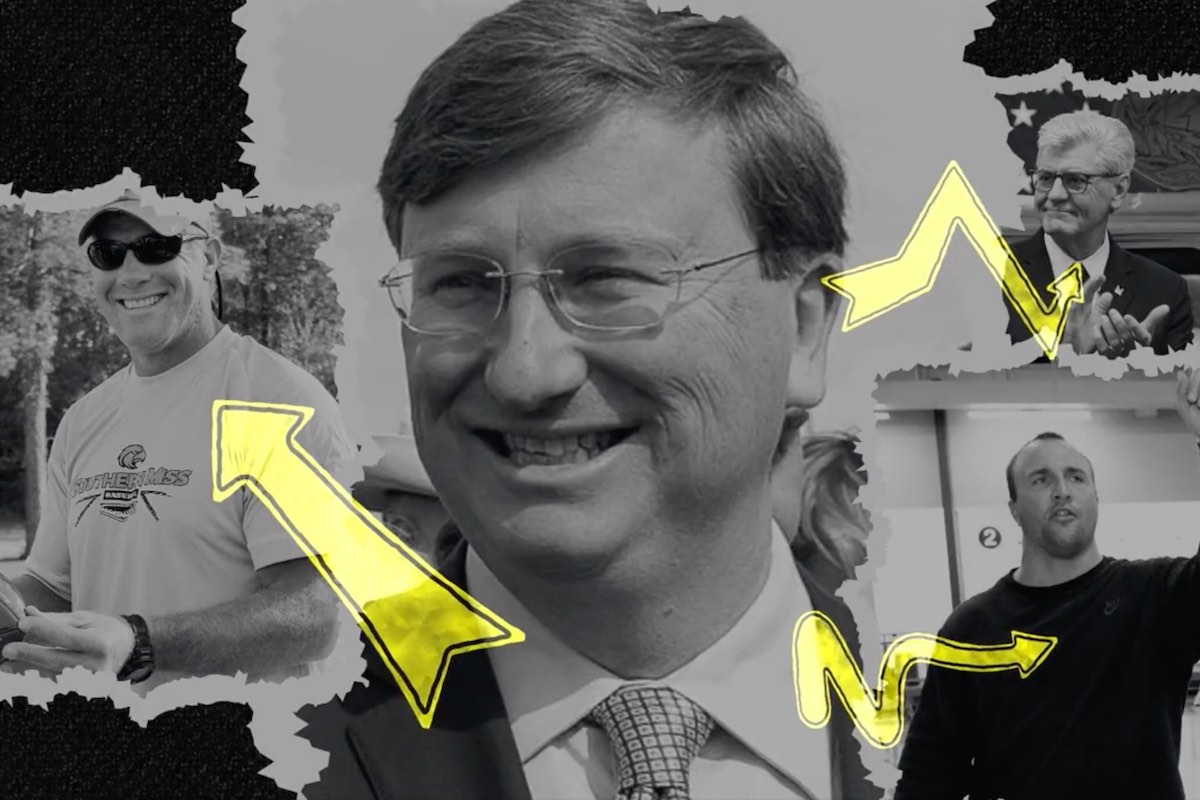A new Mississippi Democratic Party-funded social media ad focused on the state’s $77-million welfare scandal makes a shocking claim: “In 2020 as governor, Reeves allegedly schemed with former NFL quarterback Brett Favre about diverting millions to build a new volleyball stadium.”
If true, that would buttress the ad’s overall argument that the current Republican governor was a central figure in the welfare scandal. The ad cites a December 2022 Mississippi Free Press report as its source. But that story, which I reported with William Pittman, does not back up what the ad claims. (And to be clear, neither state nor federal officials have accused nor charged Bryant, Favre nor Reeves with a crime).
Speculation Is Not Our Job
In July 2022, Gov. Reeves fired the attorney who was leading the investigation in the State’s civil lawsuit, citing concerns that the attorney was too “political” after he sought information on the volleyball stadium. (The law firm the state hired to replace him, however, continued examining the volleyball issue). Then, in September 2022, former Gov. Phil Bryant released texts with Favre showing the NFL star had also reached out to the newly inaugurated Reeves in January 2020.
Based on that information, we certainly thought it was important to examine Reeves’ actions. So, we sent his office a typewritten public-records request by mail (his office does not accept records requests sent via modern communications technology) seeking text messages he had sent or received with or about Favre since the time he became governor.

The texts showed that, after the State of Mississippi cut off federal welfare money to fund the volleyball stadium at the University of Southern Mississippi, Favre reached out to Reeves asking for help convincing the Legislature to appropriate regular state funds to the project. Neither ever mentioned using TANF funds or any other illegal source in the text messages.
Nothing in those texts, nor the legislative record, suggests the governor helped Favre achieve his goals. Soon after those texts, Republican State Auditor Shad White and Democratic Hinds County District Attorney Jody Owens broke the news of the welfare scandal as they announced the first arrests.
That does not mean Reeves does not deserve further scrutiny. He has long refused to release any text messages or emails from his time as lieutenant governor (and thus the Mississippi Senate president) from January 2012 until January 2020, citing the exemption lawmakers made for the Legislature when they wrote the public-records laws.
Reeves’ decision to repeatedly invoke that exemption, which allows Reeves not to release his texts but does not forbid him from doing so voluntarily, prevents us from seeing if he took steps to scrutinize the Mississippi Department of Human Services as part of his oversight duties.
It also prevents us from seeing what he talked to Favre about before January 2020 and from pursuing answers to outstanding questions about his relationship with his personal trainer Paul Lacoste, who is named as a defendant in the civil lawsuit (but has not been accused of a crime).
Still, an absence of evidence is not evidence of wrongdoing, and our job is to communicate to readers what we know and what we are able to uncover—not to speculate about what we do not know.
It is election season. Reeves’ Democratic opponent Brandon Presley for governor is openly suggesting that the incumbent played a bigger role in the welfare scandal than currently available evidence suggests. In fact, in a press release on May 25, Presley sought to rebrand the welfare scandal as “Tategate.”
The governor did himself no favors by launching his campaign using old footage of himself at a school run by Nancy New, a nonprofit operator and criminal defendant in the scandal. But, despite all the noise and antics of modern campaigns, we still have to stick to the facts—especially when partisan actors cite our reporting to make misleading claims. And we’ll continue to report on the welfare scandal, wherever the facts lead and whomever they implicate.
Dishonest Crime Data
Speaking of misleading claims, our own Nick Judin took to Twitter this week to correct other bogus claims made by the right-wing Mississippi Center For Public Policy’s Douglas Carswell (a former member of the U.K. parliament and leader of the Brexit campaign).
Carswell pointed to data provided by the Mississippi Department of Public Safety to argue that a modest 19% decline in Mississippi’s prison population caused a whopping 741% increase in violent crime between 2016 and 2022.
“Those who argue Mississippi should incarcerate fewer people have been getting exactly what they asked for,” Carswell wrote at mspolicy.org, claiming the data showed that there were 538 violent crimes statewide in Mississippi in 2016 and 4,529 in 2022. His article even earned the notice of State Auditor Shad White, who quoted his claim that “leniency is too expensive.”
Nick quickly took Carswell to task and pointed out the most glaring error in his statistical analysis: The Mississippi Department of Public Safety data he cited from 2016 showing 538 violent crimes only included figures from a handful of agencies in two Mississippi counties (Hinds and Harrison), while the data he used for 2022 to show a 741% increase included figures from 62 counties.
Well, it’s easy to get a 741% increase if you go from sharing crime statistics from two counties to sharing crime statistics from 62 counties. As Nick noted in his tweets, the same website Carswell drew data from to write a fantasy of exploding crime warns: “As the number of agencies reporting to the state increases, crime will appear higher, so all year-over-year comparisons should be treated with caution.”
DPS literally warns you ON THIS PAGE against an analysis like this! It’s right there!
“* As the number of agencies reporting to the state increases, crime will appear higher, so all year-over-year comparisons should be treated with caution.”
These are the two datasets. Look! pic.twitter.com/vmpMYtWJh9
— Nick Judin (@nickjudin) May 24, 2023
Zooming in even further, the 2016 data included information on violent crime from just one law-enforcement agency in Hinds County and three in Harrison County. The 2022 data, on the other hand, includes information from three agencies in Hinds County and six in Harrison County.
If you compare only the four agencies included in the 2016 and 2022 data sets, however, the numbers actually show that violent crime in those jurisdictions fell from 538 in 2016 to 346 in 2022—a 36% decrease over six years.
If we were dishonest, we might claim that demonstrates that the 19% decline in the State’s overall prison population drove a 36% decrease in violent crime in those jurisdictions. But our job is not to weaponize data to grossly mislead the public in service to a narrative or a public policy agenda; our job is to inform the public in service to democracy.
As we near the second half of 2023, we’ll only get deeper into the silly season of campaign antics and outlandish political rhetoric. Our team will be here to help ensure Mississippians have the facts so they can decide what they think for themselves—not what campaign operatives, partisan media or think-tank operators want us to think. Being nonpartisan isn’t about telling you what “both sides” think; it’s about telling you what is true.
You can support our democracy-building work by donating at mfp.ms/donate, where another generous donor is doubling any gifts you give. Please donate in any amount you can to help propel our nonprofit mission forward.
This MFP Voices essay does not necessarily represent the views of the Mississippi Journalism and Education Group, the Mississippi Free Press, its staff or board members. To submit an opinion for the MFP Voices section, send up to 1,200 words and sources fact-checking the included information to azia@mississippifreepress.org.We welcome a wide variety of viewpoints.






